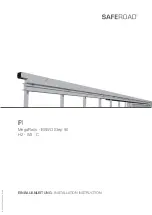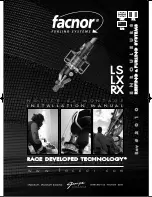
12
PLEASE NOTE: The damping function
always remains active and is not affected by
deactivating float setting.
ATTENTION
There is a risk that the top link can be unin-
tentionally moved into the floating position
if the top link is extended under tractive load
with the implement raised.
With an activated floating position (intended
or unintended), uncontrolled movements can
occur!
This shall be illustrated by the example of a
forestry crane:
With the forestry crane attached and raised,
pivoting the forestry crane can lead to a load
shift in the direction of the tractor. This can
cause the top link to shorten uncontrollably.
This can lead to considerable personal risks
as well as damage to the machine.
3. TRACTOR-SIDE INSTALLATION
• Version with fork head (A1, A2):
Mount and secure the fork head (2) on the
base unit (1) by means of the bolt (3) and the
roll pin (4). Mount and secure the fork head
on the tractor by means of the tractor side
bolt. Hole and bolt diameter must match.
• Version with eyebolt (A3):
Mount and secure the eyebolt on the tractor
by means of the tractor-side bolt. Hole and
bolt diameter must match.
• Fix the support clip (5) centrally at an ap-
propriate point on the tractor rear (provide
additional fixing plate/bracket, if necessary)
(Figs. C1, C2).
ATTENTION
• Choose the fixing point of the support clip (5)
as shown in Fig.s C2 and C3.
• Attach the release cord (2) on the top link
hook.
• If necessary, the fork head (2) on the tractor
side can be replaced by a fork head with a
different mounting hole.
• Fit high-pressure hoses (R 3/8“ thread –
hoses not included in the Walterscheid scope
of supply, except for hydraulic top links with
eyebolt (A3) on the tractor side) to the top
link and connect them to the tractor; see the
operating instructions for the tractor.
• When using for the first time, after installati-
on of the high-pressure hoses, the hydraulic
system must be vented by repeated, comple-
te extension and retraction of the piston rod.
• When putting the top link into service, ensu-
re sufficient clearance in the tractor side and
implement-side working zones (Figs. B1, B2,
B3, B4 and B5). Do not subject the top link to
bending stress.
• Damage to the piston rod (e.g. due to laying
down incorrectly or dropping) must be
avoided.
4. OPERATION
4.1 COUPLING THE IMPLEMENT WITH A
TOP LINK HOOK
• Pull and hold the release cord to open the
toplink hook
• Set the required top link length by actuating
the control valve.
• Engage the upper ball bush on the imple-
ment by means of the hook
• Release the cord.
ATTENTION
When using a top link hook, ensure that the
cord can move freely! A taut cord will release
the hook‘s locking mechanism!
The locking mechanism must engage (C3)!
4.2 COUPLING THE IMPLEMENT WITH AN
EYEBOLT
• Set the required top link length by actuating
the control valve.
• Engage and secure the eyebolt by means of
the implement-side bolt.
ATTENTION
• When putting the top link into service, ensure
sufficient clearance in the tractor-side and
implement-side working zones (Figs. B1, B2,
B3, B4 and B5). Do not subject the top link to
bending stress.
Summary of Contents for HOLHS
Page 3: ...3 B1 B2 B4 B5 B3...
Page 4: ...4 C1 C2 C3...
Page 10: ...21 NOTIZEN NOTES REMARQUES...
Page 11: ...22 NOTIZEN NOTES REMARQUES...
Page 12: ...23...





























